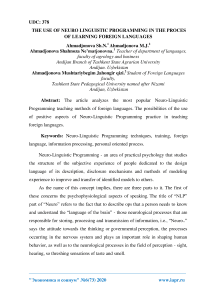The use of neuro linguistic programming in the process of learning foreign languages
Автор: Ahmadjonova Sh.N., Ahmadjonova M.J.
Журнал: Экономика и социум @ekonomika-socium
Рубрика: Основной раздел
Статья в выпуске: 6-1 (73), 2020 года.
Бесплатный доступ
The article analyzes the most popular Neuro-Linguistic Programming teaching methods of foreign languages. The possibilities of the use of positive aspects of Neuro-Linguistic Programming practice in teaching foreign languages.
Neuro-linguistic programming techniques, training, foreign language, information processing, personal oriented process
Короткий адрес: https://sciup.org/140252417
IDR: 140252417 | УДК: 378
Текст научной статьи The use of neuro linguistic programming in the process of learning foreign languages
Neuro-Linguistic Programming - an area of practical psychology that studies the structure of the subjective experience of people dedicated to the design language of its description, disclosure mechanisms and methods of modeling experience to improve and transfer of identified models to others.
As the name of this concept implies, there are three parts to it. The first of these concerns the psychophysiological aspects of speaking. The title of “NLP” part of “Neuro” refers to the fact that to describe ops that a person needs to know and understand the “language of the brain” - those neurological processes that are responsible for storing, processing and transmission of information, i.e., “Neuro..” says the attitude towards the thinking or governmental perception, the processes occurring in the nervous system and plays an important role in shaping human behavior, as well as to the neurological processes in the field of perception - sight, hearing, so threshing sensations of taste and smell.
The second part is connected with the linguistic aspect of speech activity itself. “Linguistic” emphasizes the importance of language in describing the characteristics of the mechanisms of thinking and behavior.
Communication-organization processes, ie. e. refers to linguistic fashion lam, which plays an important role in the achievement of mutual understanding between the people on what, in fact, kept all communication process.
The Third aims to study the impact on people in the pro cession of verbal communication and even to regulate their behavior. “About reprogrammed” defines the systematic thinking and behavioral processes, “program” in Greek means “clear after sequence of steps to achieve the results”. “Programming” refers to the way in which we organize our thinking, including the feelings and beliefs that would eventually reach our goals.
As part of the neurophysiological concepts it is assumed that each person has his own perception of the main channel and storage information, its so-called “representational system”. It is believed that through the channel leading man enters the main stream of Ying formation. Of course, a person thinks more complex and diverse than within the framework of only one representative system. But admits an existing member -existence preferred representational system.
Neuro-Linguistic Programming postulates a distinction of people by type, depending on which channel of perception of the world in them is dominant. People, which is characterized by the preferential treatment, can be combined into groups - psycho. In particular, the brow century, which dominates the visual channel of perception, called visual, auditory - audial, sensual.
In teaching foreign languages, attempts to use the theory of NLP have appeared relatively recently. Neuro-linguistic programs provides a huge variety of effective techniques can be used in teaching a foreign language.
In light of the dominance of personality-oriented model is trained Nia currently relevant approach to teaching a foreign language, which is based on the development of neuro-linguistic about programming.
In this regard, a very interesting study on the different strategies of development of foreign language as for example. development A.A. Pligina, candidate teachers Physical Sciences, Doctor of Psychology, one of the brightest and most of generally recognized leaders of Russian NLP , the founder of “NLP Center in Education”.
In his research in the field of personality - oriented educational technologies AA Pligin used the common approaches her Neuro-linguistic programming in the author’s reading.
E.A. Umin, Doctor of Biological Sciences, Professor and author of model of the brain: learning, memory, creative intelligence "also believes that optionally go to take into account the individual characteristics of a person, learn a foreign language. The speed of learning the language, scope and duration to occupy and should be adapted to the individual characteristics of language learners. The UMIN method provides for explicit accounting of several important individual characteristics of a person studying a foreign language. The most important of these characteristics is related to the properties of E memory: the volume of material that a person can easily stores, as well as with the individual rate of forgetting the learned material. This method takes into account the principles of the brain that are known to modern science, on the basis of which learning is fast and efficient.
"Экономика и социум" №6(73) 2020
Список литературы The use of neuro linguistic programming in the process of learning foreign languages
- Umin E. A. Foreign - easy and with pleasure. - M.: Scarab, 1993.
- Belyanin V.P. Neuro-linguistic programming and teaching foreign languages [Electronic document] / V. Belyanin // Moscow Psychological Journal. No. 1. 2004.
- Egamberdiyeva D.U. The essence of the method of video-english. Conference materials. 2016
- Ilyin, E.P. Motivation and motives. - SPb: Peter, 2000. - p. 65, 68, 253.


